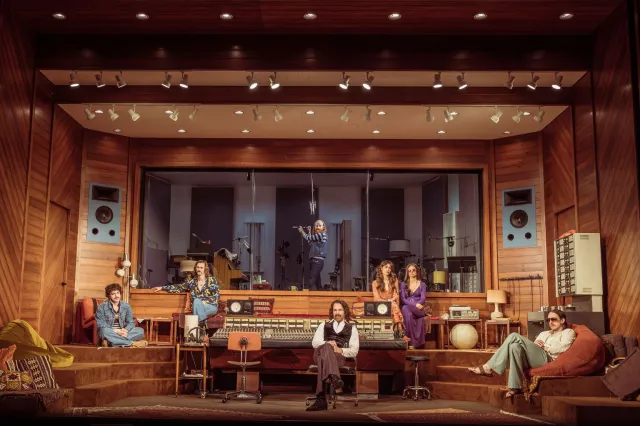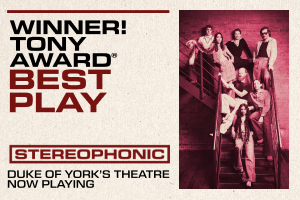
For human beings, we don’t do a great deal of just “being”.
We seem to crave drama, action, and thrills, seeking them as quickly as possible. Everything’s fast: food, Uber’s, songs fit for radio airplay.
It’s an ongoing joke in the theatre community that the best words you can read are “90 minutes, no interval.” And it’s kind of a shame.
Oscar Wilde famously said that “life imitates art,” but if, as audiences, we continue to be dismissive of pieces due to their run time, then run times will surely get shorter. And what does that say about the quality of our lives?
A bona fide Broadway hit – it’s the most Tony-nominated play of all time – Stereophonic has opened in the West End. Here in London, critics are praising its live performed soundtrack, but some are grumbling about its three-hour run time (that’s longer than the West End’s longest-running and longest musical, Les Misérables). The piece falls squarely in the “nothing happens” genre. It simply allows access into a 1970s recording studio where a band, formed of two (failing) couples and a British drummer, is laying down their make-or-break album with a couple of engineers. So much so that we have to assume the band’s name is the show’s title, and that the album went on to be a hit (read: Fleetwood Mac).
The thing is, never have I left a three-hour hang-out with my friends and complained that it went on too long because a dramatic event didn’t take place. As Diana says to sound engineer Grover, right at the end of the play, simply being there, at that time: “Honestly? This might just be the best thing that has ever happened to me.”
Because life, like making music, is not all drama in the traditional sense. It isn’t all kilo bags of coke and hit records – it’s broken coffee machines, late-night moments of vulnerability, pining for a home-cooked chicken, and reflecting on our favourite movies.
These things, so close to our own lives, could be considered mundane. I understand that many people frequent the theatre to escape the everyday in a story. But David Adjmi’s authentic writing has created a great drama, and Daniel Aukin’s observational direction keeps the eye engaged (David Zinn’s magnificent set, Enver Chakartash’s enviable costumes, Jiyoun Chang’s warm lighting certainly help), as the cast of seven tease confessions out of one another. Paired with Ryan Rumery’s exquisite sound design, which blends overheard arguments, Will Butler’s beautiful live music played by the actors, and swelling silence, a year of recording (six days of which are dedicated to perfecting the tuning of a snare drum) is reduced to 180 minutes.
Can long plays be overindulgent? Sure. But sometimes it is essential. Clever writing doesn’t just tell us who the characters are; it shows us by opening a window to their lives. It’s what Matthew López’s whopper two-part play The Inheritance was so widely celebrated for. And that ran for seven hours. Plus, a three-hour film is more often than not praised for the feat. Take the victorious Oppenheimer, for example. And there are no scheduled toilet breaks in the cinema. In film auditoriums, perhaps more than in theatre, audiences seem more willing to surrender their time and invest in the world being built.
Of course, a shorter, more conventional running time has its benefits. There can be a great climactic ending, we can feel a rush, and storytelling can be neat and tight. Just thinking practically, they make theatre more accessible, and you’re able to plan better for transportation or a dinner reservation, perhaps. A long running time usually comes with an adjusted start time (Stereophonic has matinees at 1pm and evening performances at 7pm), so there is a risk of latecomers or rushing. It’s also heavily advertised that readmission is not guaranteed, and with the first act running for one hour and 40 minutes, it can be for some audiences at best, uncomfortable, at worst, impossible.
A recent poll, which asked 20,000 West End theatregoers, found that audiences are discouraged from booking shows with runtimes over two and a half hours or shows with no interval. The diverse nature of shows playing in London – the aforementioned mighty Les Mis is just a few minutes walk away from the equally mighty Six – 90 minutes of pop theatre tunes in a remixed Tudor concert. There is something for everyone.
Even those who fancy watching a “mammoth 24-hour acting masterclass” from Ruth Wilson were able to just a couple of years ago when she starred against 100 unrehearsed stage partners in The Second Woman. There, the length of the play was the pull, and the WhatsOnStage editorial team can think of other examples of long, but brilliant, productions: Roman Tragedies, Angels in America, to name just a couple.
Ultimately, what does it say about our attention spans if we can watch hours of mobile phone footage of Rachel Zegler’s Evita on TikTok, or binge ten hours of a television series in one sitting, but struggle to connect with live performers on stage for three hours? And will we see a change in theatre to better cater for the changing needs and wants of audiences?
















